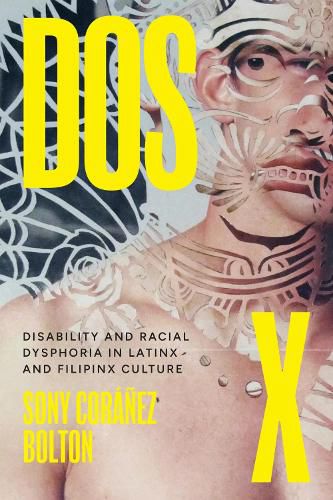Readings Newsletter
Become a Readings Member to make your shopping experience even easier.
Sign in or sign up for free!
You’re not far away from qualifying for FREE standard shipping within Australia
You’ve qualified for FREE standard shipping within Australia
The cart is loading…






An examination of the interconnectedness of brown-racialized people across multiple identities, told through case studies of television, literature, and writing.
As a Filipinx immigrant to the United States, Sony CorANez Bolton has frequently been mistaken as Mexican. Dos X theorizes such misrecognition. What does it mean to exist in this liminal state, which CorANez Bolton dubs the "racial uncanny"? What generative possibilities emerge from the presumed interchangeability of Latinx and Filipinx bodies-and from the in-betweenness of brownness as such?
Dos X tracks misrecognition through cultural products like the TV series Undone, Brian Ascalon Roley's American Son, and the nonfiction work of Jose Antonio Vargas. Misrecognition, CorANez Bolton argues, produces moments of uncanniness in which subjects experience dysphoric attachments to identities that aren't supposed to be theirs. In the context of racial capitalism, racial dysphoria is a disability because it undermines certainty about what one's body is and therefore what role one is meant to play as a laborer. But racial dysphoria can also be revealing. CorANez Bolton identifies vast potential in this supposed disability, which compels its "sufferers" to confront their shared position within the social, political, and economic organization of capital's empire, opening new avenues for liberatory solidarity.
$9.00 standard shipping within Australia
FREE standard shipping within Australia for orders over $100.00
Express & International shipping calculated at checkout
An examination of the interconnectedness of brown-racialized people across multiple identities, told through case studies of television, literature, and writing.
As a Filipinx immigrant to the United States, Sony CorANez Bolton has frequently been mistaken as Mexican. Dos X theorizes such misrecognition. What does it mean to exist in this liminal state, which CorANez Bolton dubs the "racial uncanny"? What generative possibilities emerge from the presumed interchangeability of Latinx and Filipinx bodies-and from the in-betweenness of brownness as such?
Dos X tracks misrecognition through cultural products like the TV series Undone, Brian Ascalon Roley's American Son, and the nonfiction work of Jose Antonio Vargas. Misrecognition, CorANez Bolton argues, produces moments of uncanniness in which subjects experience dysphoric attachments to identities that aren't supposed to be theirs. In the context of racial capitalism, racial dysphoria is a disability because it undermines certainty about what one's body is and therefore what role one is meant to play as a laborer. But racial dysphoria can also be revealing. CorANez Bolton identifies vast potential in this supposed disability, which compels its "sufferers" to confront their shared position within the social, political, and economic organization of capital's empire, opening new avenues for liberatory solidarity.